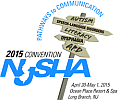Factors Predicting SLP Graduate Students' Ability to Interpret Nonverbal Cues
Thursday, 4:00pm to 6:00pm
Seabright
Poster 2
Previous studies examined the role of nonverbal communication in patients' judgment of clinical services, perceived clinical competence of clinicians, therapy outcomes, and overall interpersonal skills. In a related study, no relationship was found between knowledge of nonverbal cues and age, coursework, or clinical experience. Because previous research analyzed general knowledge of nonverbal cues, the current study aimed to identify factors contributing to true decoding competence rather than knowledge. The current study was a 'survey and test' research design that aimed to identify correlations and interactions between survey demographics and scores on the Mini Profile of Nonverbal Sensitivity (Mini-PONS) test. Participants included 59 graduate students enrolled in Speech-Language Pathology graduate programs across the nation. Selected survey questions pertained to participants' community setting, language experience, age, graduate program, credit hours, courses completed, estimated GPA, and clinical experience. Results of the study revealed that of all the variables measured, GPA was shown to have the highest probability of determining sensitivity to nonverbal cues. Although there was no interaction between completed coursework and scores on the test, type of instruction should be further investigated to determine optimal training programs that aim at improving the ability of speech-language pathologists to interpret nonverbal communication.
Track:
Student
